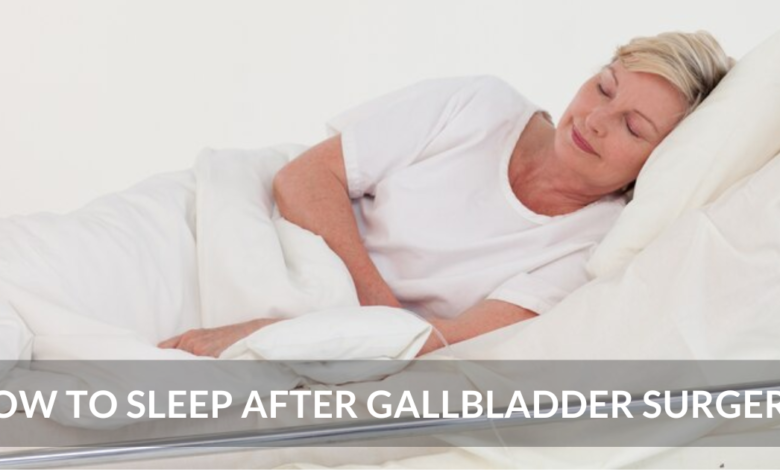How To Sleep After Gallbladder Surgery (2024)

Gallbladder surgery, also known as cholecystectomy, is a frequent technique used to relieve the symptoms of gallstones or other gallbladder problems. While surgery is often required for better health, many people suffer from sleeping habits thereafter owing to discomfort, pain, and changes in routine. In this post, we’ll look at several successful ways to improve your sleep following gallbladder surgery.
What is Gallbladder?
The gallbladder is a tiny organ in the upper right belly, just beneath the liver. Its main function is to store and concentrate bile, a digestive fluid made by the liver. When fat-containing food enters the small intestine, the gallbladder contracts and releases bile into the digestive tract, which aids in fat digestion and absorption.
What is Gallbladder Surgery?
Gallbladder surgery is the removal of the gallbladder using standard open surgery or minimally invasive laparoscopic procedures. It is often indicated for people who have significant gallstone symptoms or consequences, such as gallbladder inflammation (cholecystitis) or bile duct blockage.

When is Gallbladder Surgery Necessary?
Gallbladder surgery, commonly known as cholecystectomy, is required in numerous cases:
- Gallstones: If gallstones cause severe abdominal pain, nausea, vomiting, or gallbladder inflammation (cholecystitis), the gallbladder may need to be removed surgically.
- Gallbladder inflammation: In cases of acute or chronic gallbladder inflammation, surgery may be required to relieve symptoms and prevent consequences.
- Gallbladder polyps: Polyps in the gallbladder can be malignant or cause cancer, so surgery to remove the gallbladder may be considered as a precaution.
- Biliary dyskinesia: Biliary dyskinesia is a disorder characterized by faulty gallbladder function, which can cause abdominal pain and digestive problems. If conservative therapy fails to alleviate symptoms, surgery may be an option.
- Complications: If gallstones cause bile duct blockage, pancreatitis, or infection, surgery may be required to treat the underlying problem and prevent subsequent complications.
Overall, gallbladder surgery is usually suggested when gallbladder-related problems seriously impair a person’s quality of life or endanger their health.
You May Like to Read: Does Nair Cause Cancer? Yes OR NO?
How Gallbladder Surgery Can Disrupt Your Sleep
Gallbladder surgery can affect your sleep in a variety of ways.
Pain: Pain and discomfort are normal following gallbladder surgery, especially around the incision sites. This discomfort can make it difficult to find a suitable sleeping posture and may cause you to wake up during the night.
Medications: Post-surgery pain drugs can have sleep-related negative effects. Some pain drugs may cause drowsiness, while others may cause insomnia or interrupt regular sleep patterns.
Changes in Eating Habits: After gallbladder surgery, you may need to adjust your diet, such as avoiding fatty or spicy meals. Adjusting to these dietary changes can affect your digestion and cause discomfort or heartburn, which can interfere with your ability to sleep well.
Anxiety and Stress: Surgery, including minimally invasive operations like gallbladder surgery, can be unpleasant. Anxiety over the surgery, as well as concerns about recovery and potential consequences, can all lead to sleep disruptions.
Physical limits: In the immediate aftermath of gallbladder surgery, you may experience physical limits that prevent you from moving freely in bed. This can make it difficult to find a position where you can sleep comfortably.
Pattern Disruption: Surgery and rehabilitation might throw off your normal pattern, especially your sleep schedule. Changes in routine can disrupt your body’s natural schedule, making it difficult to fall and remain asleep.
Digestive Issues: Gallbladder removal can occasionally cause digestive issues like diarrhea or constipation, which may affect sleep.

Tips for Better Sleep After Gallbladder Surgery
Now that we’ve discussed some of the issues involved with sleep following gallbladder surgery, let’s look at some practical recommendations to help you get the rest you need for a full recovery.
1. Establish a Relaxing Bedtime Routine
Developing a relaxing bedtime ritual helps indicate to your body that it’s time to relax and prepare for sleep. Consider gently stretching, reading a book, or using relaxation techniques like deep breathing or meditation.
Avoid stimulating activities or screens, such as watching TV or using electronic gadgets, as these can interfere with your ability to fall asleep.
2. Optimize Your Sleep Environment
Make your bedroom a sleep-friendly environment by keeping it dark, quiet, and cool. Invest in blackout curtains or an eye mask to block out light, earplugs, or a white noise machine to mask disruptive sounds, and set the thermostat to a comfortable resting temperature. A comfy mattress and supportive pillows can also help to improve sleep quality.
3. Manage Pain Effectively
As previously stated, controlling pain is critical for promoting restful sleep following gallbladder surgery. Follow your doctor’s pain management instructions, which may include taking prescribed drugs as instructed or using heat therapy to relieve discomfort.
4. Practice Good Sleep Hygiene
Maintaining appropriate sleep hygiene habits might help you manage your sleep-wake cycle and get better sleep. Aim for a consistent sleep routine by going to bed and waking up at the same time every day, including weekends. Limit coffee and alcohol use, particularly in the hours coming up to bedtime, as these chemicals can disrupt sleep.
5. Stay Active During the Day
Regular physical activity during the day can lead to better sleep at night. Include modest exercise, such as walking or easy stretching, in your routine, and avoid vigorous activity close to bedtime.
6. Manage Stress and Anxiety
Stress and anxiety can worsen sleep problems, especially during the recovery period. To calm your mind and promote relaxation before bedtime, try stress-reduction strategies like mindfulness, progressive muscle relaxation, or guided imagery.
7. Follow a Healthy Diet
Eating a good diet is vital for general health and can improve sleep quality. Consume a well-balanced diet that includes fruits and vegetables, lean proteins, and whole grains.
Avoid eating heavy or spicy meals close to bedtime, since they might cause intestinal pain and impair sleep. Stay hydrated by drinking plenty of water throughout the day, but limit fluid intake before bedtime to avoid midnight awakenings.
8. Use Supportive Sleep Aids
In some circumstances, adopting supportive sleep aids or accessories can improve sleep quality and encourage relaxation. Consider utilizing pillows or cushions to keep your body in a comfortable position, especially if you’re feeling pain or discomfort from your surgical wounds.
Furthermore, relaxation treatments such as aromatherapy with lavender essential oil or herbal beverages with calming elements like chamomile may help promote sleep.

Things to Avoid When Sleeping After Gallbladder Surgery
1. Sleeping on Your Stomach
Sleeping on your stomach might apply pressure on the surgery site, causing discomfort or suffering. Avoid sleeping on your stomach, especially in the early stages of recovery, to avoid difficulties or delays in healing.
2. Overeating Before Bedtime
Large meals or high-fat foods before bedtime might aggravate digestive problems and interrupt sleep. Choose lighter, more easily digestible meals in the evening, and avoid eating at least two to three hours before bedtime to allow for optimal digestion.
3. Engaging in Strenuous Activities Before Bed
Strenuous activities close to bedtime might stimulate the body and make it harder to fall asleep. Avoid excessive exercise or physical exertion near bedtime, instead opt for easy stretching or relaxation techniques to induce relaxation and prepare your body for sleep.
4. Consuming Stimulants Before Bed
Caffeine and nicotine are both stimulants that can make it difficult to fall and stay asleep. Avoid stimulants in the evening and instead drink decaffeinated beverages or herbal teas to encourage relaxation and better sleep quality.
5. Ignoring Pain or Discomfort
Pain or discomfort following gallbladder surgery should not be overlooked because it might disrupt your sleep and indicate underlying issues. If you are experiencing persistent or worsening discomfort, visit your doctor for appropriate treatment and advice.

Conclusion
Recovery following gallbladder surgery demands patience, effort, and good self-care, which includes prioritizing sleep quality. By following the advice in this article and obtaining help from healthcare experts and loved ones, you can improve your sleep after gallbladder surgery and make your recovery go more smoothly.
Frequently Asked Questions
Why is it hard to sleep after gallbladder surgery?
You may find it difficult to sleep comfortably after gallbladder surgery since your body is still recovering. Pain and discomfort around the incision, changes in sleeping positions owing to soreness, and feelings of anxiety or worry can all make it difficult to sleep well.
What can I do to sleep better after gallbladder surgery?
To help you sleep better after gallbladder surgery, look for a comfortable resting position that does not put pressure on your incision. You can use more pillows to help support your body and alleviate discomfort. Also, follow your doctor’s advice on pain medicine and take it exactly as given to control any discomfort that may keep you awake.
Should I avoid certain foods or drinks before bedtime after gallbladder surgery?
After gallbladder surgery, it’s best to avoid heavy or spicy foods, as well as caffeine and alcohol, before bedtime. All of these can irritate your digestive system, making it difficult to sleep peacefully. If you’re hungry before bedtime, choose light, easily digestible snacks.
Is it normal to feel anxious or worried about sleeping after gallbladder surgery?
Feeling apprehensive or concerned about sleeping after gallbladder surgery is completely normal. It’s common to be concerned about accidentally harming yourself or being unable to find a comfortable position. Deep breathing or listening to relaxing music can help you relax before going to bed.
When should I contact my doctor if I can’t sleep after gallbladder surgery?
Consult a doctor if sleep issues or severe pain persist after gallbladder surgery, as they can advise on managing symptoms, suggest medication changes, and improve sleep quality.





I was recommended this website by my cousin I am not sure whether this post is written by him as nobody else know such detailed about my trouble You are amazing Thanks
Somebody essentially lend a hand to make significantly posts I might state That is the very first time I frequented your web page and up to now I surprised with the research you made to create this particular put up amazing Excellent job